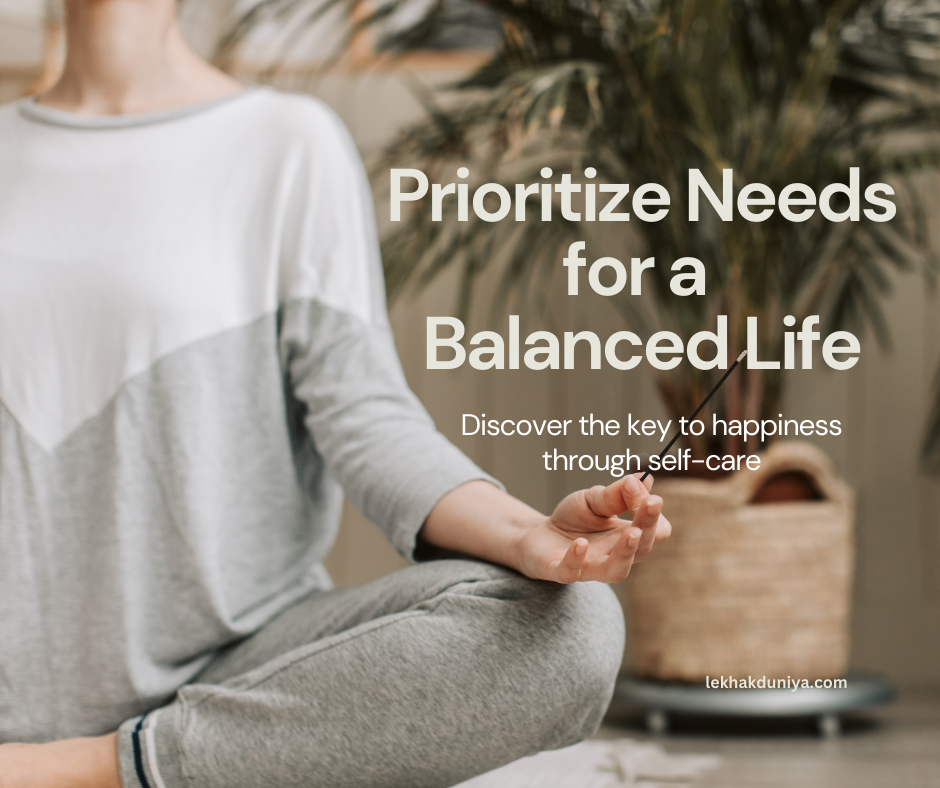In the hustle and bustle of everyday life, it’s easy to lose sight of what truly matters—your well-being. Often, people associate putting their needs first with selfishness, but in reality, prioritizing yourself is crucial for maintaining a balanced, fulfilling life. In this article, we’ll explore why putting your needs first is essential and how doing so can positively impact every aspect of your life.
Table of Contents
Understanding the Concept of Prioritizing Your Needs
Prioritizing your needs means recognizing what is most important to you and ensuring those elements are given the attention they deserve. It’s about understanding that you can’t pour from an empty cup; if you’re constantly drained and exhausted, you won’t be able to give your best to others or any part of your life. This is not about ignoring the needs of others but about finding a balance where your well-being is also a priority.
The Common Misconception: Selfishness vs. Self-Care

One of the biggest barriers to prioritizing your needs is the fear of being perceived as selfish. Society often promotes the idea that putting others first is virtuous, leading many to neglect their own needs. However, taking care of yourself is not the same as being selfish. Self-care is about maintaining your physical, emotional, and mental health so you can be the best version of yourself for both yourself and others.
The Psychological Importance of Prioritizing Your Needs

- The Impact on Mental Health: Prioritizing your needs has profound psychological benefits. It allows you to maintain a healthier mental state, reducing the likelihood of feeling overwhelmed or burnt out. When you make time for yourself, you create space to process your thoughts, reflect, and recharge.
- Reducing Stress and Anxiety: By prioritizing your needs, you can significantly reduce stress and anxiety. Taking time for yourself, whether through relaxation, hobbies, or simply a break, helps lower cortisol levels—the hormone responsible for stress. This leads to a calmer mind and a more focused, productive day.
- Boosting Self-Esteem and Confidence: When you put yourself first, you send a powerful message to yourself: you matter. This boosts your self-esteem and confidence as you start to value your worth. As a result, you’ll find yourself more assertive and able to make decisions that align with your true desires.
- Emotional Well-Being and Personal Fulfillment: Your emotional well-being is closely tied to how well you prioritize your needs. When you consistently put yourself last, it can lead to feelings of resentment, frustration, and even depression. On the other hand, when you prioritize your needs, you’re more likely to feel fulfilled and content with your life.
The Physical Benefits of Self-Prioritization
- Enhancing Physical Health through Self-Care: Your physical health is another area that benefits from self-prioritization. When you make your well-being a priority, you’re more likely to engage in activities that promote a healthy body, such as regular exercise, a balanced diet, and adequate sleep.
- Better Sleep and Rest: Prioritizing your needs often means recognizing the importance of rest. Sleep is crucial for your overall health, and by ensuring you get enough rest, you’re better equipped to handle the demands of your day. A well-rested body leads to better decision-making, mood regulation, and energy levels.
- Improved Diet and Exercise: When you make your health a priority, you’re more likely to make better choices in terms of diet and exercise. This doesn’t mean you have to follow a strict regimen; rather, it’s about making mindful choices that support your physical well-being.
- Prevention of Burnout and Fatigue: One of the most significant risks of not prioritizing your needs is burnout. Constantly pushing yourself without taking breaks can lead to extreme fatigue and a lack of motivation. By taking care of yourself regularly, you can prevent burnout and maintain a steady level of energy and enthusiasm for life.
The Social Impact of Prioritizing Your Needs
- Strengthening Relationships: Interestingly, when you prioritize your needs, your relationships also benefit. Taking care of yourself helps you better support and care for others. You’re more present, more patient, and more understanding, which can strengthen your bonds with others.
- The Importance of Setting Boundaries: Setting boundaries is a crucial part of prioritizing your needs. It involves knowing your limits and communicating them clearly to others. This not only protects your well-being but also teaches others how to treat you with respect.
- Healthy Communication and Mutual Respect: When you prioritize your needs, you set a standard for healthy communication. You become more assertive in expressing your thoughts and feelings, which fosters mutual respect in your relationships. Others are more likely to reciprocate this respect, leading to healthier interactions.
- Modeling Self-Care for Others: By prioritizing your needs, you also set a positive example for those around you, especially children or younger family members. When they see you taking care of yourself, they learn the importance of self-care and are more likely to adopt similar habits in their own lives.
Common Obstacles to Prioritizing Your Needs
- Guilt and Social Pressure: Guilt is a common obstacle when it comes to prioritizing your needs. Many individuals struggle with guilt when taking time for themselves, particularly when they have obligations to others. Social pressure can also play a role, as society often values selflessness over self-care. Overcoming these feelings of guilt and understanding that taking care of yourself is not only okay but necessary is key to prioritizing your needs.
- Time Management Challenges: Another significant obstacle is time management. Many people feel they don’t have enough time to prioritize their needs due to busy schedules and numerous responsibilities. However, by learning effective time management skills, you can carve out time for self-care without sacrificing other important aspects of your life.
- The Fear of Judgment: The fear of being judged by others can also prevent you from prioritizing your needs. You may worry that others will think you’re being selfish or lazy. It’s important to remember that prioritizing your needs is about maintaining your well-being, and those who truly care about you will understand and support your decision.
Strategies to Start Prioritizing Your Needs
1. Identifying Your Core Needs
The first step in prioritizing your needs is identifying what they are. Take some time to reflect on what truly matters to you—whether it’s physical health, mental well-being, personal growth, or relationships. Once you’ve identified your core needs, you can begin to prioritize them in your daily life.
2. Practical Steps to Incorporate Self-Care into Daily Life
- Creating a Self-Care Routine: One of the most effective ways to prioritize your needs is by creating a self-care routine. This could include activities like meditation, exercise, journaling, or simply spending time doing something you enjoy. By incorporating these activities into your daily routine, you ensure that your needs are consistently being met.
- Learning to Say No: Learning to say no is another important strategy. It’s okay to decline requests or invitations that don’t align with your needs or that would overwhelm you. Saying no allows you to protect your time and energy for the things that truly matter.
3. Seeking Support from Others
Don’t be afraid to seek support from others as you begin to prioritize your needs. Whether it’s talking to a friend, family member, or therapist, having someone to support you can make the process easier and more effective.
Long-Term Benefits of Prioritizing Your Needs

- Achieving a Balanced and Fulfilling Life: By consistently prioritizing your needs, you can achieve a more balanced and fulfilling life. You’ll find that you’re happier, healthier, and more content, which positively impacts every aspect of your life.
- Improved Overall Well-being: Prioritizing your needs leads to improved overall well-being. You’ll experience better mental, emotional, and physical health, which will allow you to live a more vibrant and satisfying life.
- Sustained Personal Growth: Finally, prioritizing your needs fosters sustained personal growth. When you take care of yourself, you’re more likely to pursue your goals and dreams, leading to continuous growth and self-improvement.
So, prioritizing your needs is not a luxury—it’s a necessity. It’s essential for maintaining a balanced, healthy, and fulfilling life. By taking the time to care for yourself, you’re not only improving your well-being but also enhancing your ability to be there for others. Start prioritizing your needs today, and watch as your life transforms for the better.
FAQs
Q1. Is prioritizing my needs selfish?
Ans: No, prioritizing your needs is not selfish. It’s a form of self-care that ensures you have the energy and well-being to take care of others and fulfill your responsibilities effectively.
Q2. How can I prioritize my needs without feeling guilty?
Ans: You can prioritize your needs without feeling guilty by understanding that self-care is necessary for your well-being. Remember that prioritizing your own well-being enhances your ability to be fully engaged and effective in every aspect of your life.
Q3. What are some simple ways to start prioritizing my needs?
Ans: Some simple ways to start prioritizing your needs include setting aside time each day for self-care, learning to say no to requests that don’t align with your needs, and setting boundaries to protect your time and energy.
Q4. How does prioritizing my needs benefit others around me?
Ans: When you prioritize your needs, you’re better positioned to care for others. You’re more patient, understanding, and present in your relationships, strengthening your connections with those around you.
Q5. Can prioritizing my needs improve my mental health?
Ans: Yes, prioritizing your needs can significantly improve your mental health. By taking time for yourself, you reduce stress, increase self-esteem, and create a more balanced, fulfilling life.




Thanks I have recently been looking for info about this subject for a while and yours is the greatest I have discovered so far However what in regards to the bottom line Are you certain in regards to the supply
Thank you for your sharing. I am worried that I lack creative ideas. It is your article that makes me full of hope. Thank you. But, I have a question, can you help me?
Thanks for sharing. I read many of your blog posts, cool, your blog is very good.
Your article helped me a lot, is there any more related content? Thanks!
Thanks for sharing. I read many of your blog posts, cool, your blog is very good.
Simply wanna admit that this is very helpful, Thanks for taking your time to write this.